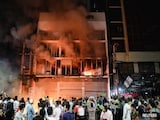A criminal group in Brazil set fire to at least 35 buses and one train car in Rio de Janeiro on Monday, the Guardian reported. The bus burnings occurred shortly after a police operation killed the nephew and right-hand man of a militia boss known as "Zinho." He has been identified as Matheus da Silva Rezende.
Industry group Rio Onibus said 20 of the vehicles were city buses, five were part of the city's rapid transit fleet and the remainder were chartered or tourism buses. The incident disrupted public transport in the area, causing headaches for commuters and leading to at least 45 schools closing, affecting thousands of students.
Footage shows the gang members forcing passengers and crew off the buses before spraying liquid inside and setting them on fire. No deaths or injuries have been reported in the blazes.
Watch the video here:
Rio de Janeiro state Governor Claudio Castro said the police had delivered a "hard blow to one of the largest militias in the west" of Rio, describing the nephew, who goes by the alias "Faustao" as a "known warlord."
"In addition to being related to the criminal (head of the militia), he acted as the paramilitary group's 'man of war,' being the main person responsible for the turf wars that terrorize residents in Rio," Mr Castro said on Twitter.
The Military Police said it arrested 12 suspects involved in the fires, in addition to preventing 15 individuals from setting a cargo truck on fire in one of the city's main gateways. Governor Castro said the 12 suspects would be charged with “terrorist actions.”
''I have no doubt that tomorrow will be a much more orderly and calm day,'' he told reporters, vowing to wage a ''hard fight'' against such criminals.
As per Reuters, Rio's so-called militias, often composed of current and former police officers, have become one of the region's largest security threats. Originally set up as self-defense forces for poor neighborhoods blighted by drug gangs, they have now metastasized into criminal outfits operating in multiple different rackets.
Security experts described Monday's attacks as a brazen offensive against Rio's authorities which exposed successive governments' failure to bring organised crime under control.















